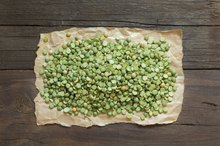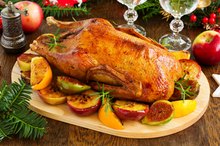Are Refried Beans Starch or Protein?
Beans are a valuable addition to your diet not only because they are inexpensive, but because they are such a nutritional powerhouse. Like other beans, refried beans contain carbohydrates, protein, fiber, minerals – like magnesium, phosphate and potassium – and several B-vitamins. Because they provide significant amounts of both carbohydrates and protein, refried beans are counted as partly starch and partly protein.
Diabetic Exchange Lists for Meal Planning
The Exchange Lists for Meal Planning were created to make it simpler for people with diabetes to plan meals and snacks that provide balanced nutrition and keep blood sugar levels on an even keel. Foods with similar nutrient profiles are grouped together and given standard serving sizes to make eating the right foods in the right portion sizes simple even when you are away from home.
Starch and Protein
Do Green Field Peas Count as Vegetable or Starch in Diabetic Diet?
Learn More
The basic groups in the Exchange List system are starches, fruits, vegetables, milk, meats and meat substitutes and fats. The starch group includes starches such as rice, pasta and bread as well as starchy vegetables such as beans, corn and potatoes. A starch exchange is one slice of bread, ½ cup of rice or pasta or ½ cup of starchy vegetables and each starch exchange contains about 15 g of carbohydrates, 3 g of protein, and 80 calories. Meats and meat substitutes are divided into categories depending upon their fat content. Each meat exchange has 7 g of protein, but the fat and calorie content increase as you move from very lean meat – 0 g fat, 35 calories – to high fat meat – 8 g fat, 100 calories.
- The basic groups in the Exchange List system are starches, fruits, vegetables, milk, meats and meat substitutes and fats.
Starch & Protein
Depending on the the brand you buy, refried beans have about 16 g of carbohydrates and 7 g of protein in each ½ cup serving. Since each starch exchange has 15 g of carbohydrates, ½ cup of refried beans counts as 1 starch exchange. Because refried beans also have 7 g of protein – the amount in a meat or meat substitute exchange – they also count as 1 lean meat exchange.
What About the Fat?
Pot Roast Nutrition
Learn More
Refried beans come prepared in one of three ways: traditional, vegetarian and fat-free 1. Traditional refried beans are prepared with lard, which is an added fat 1. Even though they contain fat, there is no need to document the beans as a fat exchange because the lean meat exchange allows for up to 3 g of fat per serving and most brands of refried beans have less than 2 g of fat. Again, check the label. If you are eating fat-free refried beans, you can document them as 1 very lean meat exchange instead of 1 lean meat exchange.
- Refried beans come prepared in one of three ways: traditional, vegetarian and fat-free 1.
- Even though they contain fat, there is no need to document the beans as a fat exchange because the lean meat exchange allows for up to 3 g of fat per serving and most brands of refried beans have less than 2 g of fat.
Related Articles
References
- USDA National Nutrient Database for Standard Reference; Refried Beans, Canned, Traditional
- The American Diabetes Association and the American Dietetic Association; Choose Your Foods: Exchange Lists for Diabetes; Anne Daly; 2007
- Beans, black turtle, canned. FoodData Central. U.S. Department of Agriculture. Published April 1, 2019.
- Winham DM, Hutchins AM, Thompson SV. Glycemic response to black beans and chickpeas as part of a rice meal: a randomized cross-over trial. Nutrients. 2017;9(10):1095. doi:10.3390/nu9101095
- Fuentes‐Zaragoza E, Sánchez‐Zapata E, Sendra E et al. Resistant starch as prebiotic: A review. Starch/Stärke. 2011;63:406-415. doi:10.1002/star.201000099
- Anderson JW, Baird P, Davis Jr RH, et al. Health benefits of dietary fiber. Nutr Rev. 2009;67(4):188-205. doi:10.1111/j.1753-4887.2009.00189.x
- Garden-Robinson J, McNeal K. All about beans nutrition, health benefits, preparation and use in menus. North Dakota State University. Updated February 2019.
- Fernandes AC, Nishida W, da Costa Proença RP. Influence of soaking on the nutritional quality of common beans (Phaseolus vulgaris L.) cooked with or without the soaking water: A review. Int J Food Sci Technol. 2010;45:2209–2218. doi:10.1111/j.1365-2621.2010.02395.x
- Tuck C, Ly E, Bogatyrev A, et al. Fermentable short chain carbohydrate (FODMAP) content of common plant-based foods and processed foods suitable for vegetarian- and vegan-based eating patterns. J Hum Nutr Diet. 2018;31(3):422-435. doi:10.1111/jhn.12546
Resources
Writer Bio
Chance Woods has been a personal trainer since 2002, specializing in fitness and nutrition. She holds a Bachelor of Science in dietetics.









